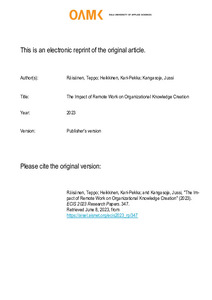The Impact of Remote Work on Organizational Knowledge Creation
Räisänen, Teppo; Heikkinen, Kari-Pekka; Kangasoja, Jussi (2023)
Lataukset:
Räisänen, Teppo
Heikkinen, Kari-Pekka
Kangasoja, Jussi
Association for Information Systems
2023
All rights reserved. This publication is copyrighted. You may download, display and print it for Your own personal use. Commercial use is prohibited.
Julkaisun pysyvä osoite on
https://urn.fi/URN:NBN:fi-fe2023060852870
https://urn.fi/URN:NBN:fi-fe2023060852870
Tiivistelmä
The COVID-19 pandemic caused most companies and organizations to start utilizing remote work.
Naturally, this gave rise to many issues regarding employee performance, communication, and
collaboration, especially in the early stages of the pandemic. Since the beginning of the pandemic,
organizations and employees have learned to cope with the situation. In this paper, we wanted to study
how the COVID-induced remote work period has impacted organizational knowledge creation
processes. By conducting a case study in a higher education organization, we conclude that the SECI
mode of socialization was affected the most by the remote work period. In addition, we found no
differences between genders. Younger employees were better at combination, and employees from the
ICT department coped better with socializing during the remote work period. Based on the results of
the study, we conclude that if remote work remains dominant, organizations might stand to lose more
tacit knowledge due to lowered socialization over time.
Naturally, this gave rise to many issues regarding employee performance, communication, and
collaboration, especially in the early stages of the pandemic. Since the beginning of the pandemic,
organizations and employees have learned to cope with the situation. In this paper, we wanted to study
how the COVID-induced remote work period has impacted organizational knowledge creation
processes. By conducting a case study in a higher education organization, we conclude that the SECI
mode of socialization was affected the most by the remote work period. In addition, we found no
differences between genders. Younger employees were better at combination, and employees from the
ICT department coped better with socializing during the remote work period. Based on the results of
the study, we conclude that if remote work remains dominant, organizations might stand to lose more
tacit knowledge due to lowered socialization over time.
